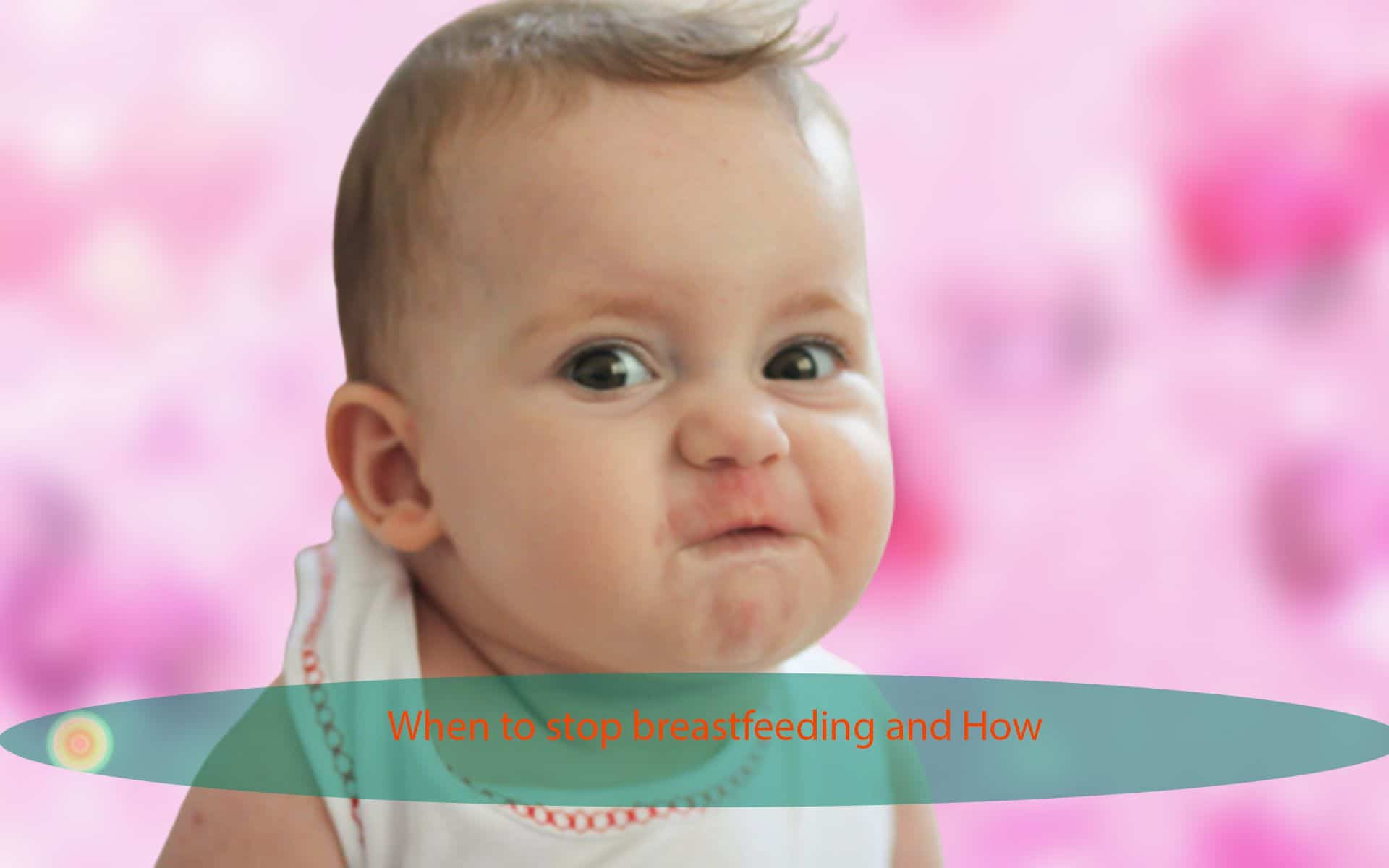When to stop breastfeeding and How ?
Are you one of those who think about stopping breastfeeding? Maybe you have tried and failed or you want to learn some tactics in the future. When is the right time to stop breasfeeding your baby and what is the best way to do it? Read on now and get lots of practical tips on stop breastfeeding.
You should be proud that you gave your baby the best gift of your milk.
How And When To Stop Breastfeeding
If your breastfeeding relationship has settled in, how long should you continue breastfeeding? Three months? Six months? A year? Or even several years?
The World Health Organization (WHO) and other health authorities recommend feeding babies with breast milk only in the first six months of life and continuing to give them breast milk at least until the age of two, in addition to other foods – the so-called complementary food.
Because breast milk is more than just food. Breast milk is a natural comfort when your child is scared or tired, and it also contains immune-boosting ingredients that increase when your baby is sick.
Anthropologists estimate that the natural weaning age in humans is even higher than at two years. When you look at factors such as tooth development and body weight and compare them to other primates and historical evidence, some researchers believe it could be two to four years, while others believe that our ancestors may be as young as six or breastfeeding for seven years.
Today, more than 60% of mothers in industrialized countries give babies or baby foods before the age of six months, although the WHO advises against it.
When is the right time to wean my baby?

weaning
Breastfeeding describes the process when you stop feeding your baby with breast milk. Ideally, the first step in weaning is to slowly feed your baby alongside your breast milk after about six months. The weaning process then continues until breast milk has been completely replaced by other foods and drinks.
After six months, your baby will need larger amounts of certain nutrients – such as iron, zinc, and vitamins B and D – that it cannot get through breast milk or its own reserves.
But solid food can only supplement your baby’s milk meals at the beginning and only gradually replace it. Breast milk remains its main source of nutrients for many months to come.
A typical seven month old baby still gets 93% of its calories from milk. Even at the age of 11 to 16 months, milk can still make up half of the daily calorie intake.
Mothers sometimes think that breast milk is no longer important once their baby starts eating solid foods, but strictly speaking, there is no better milk for babies, no matter how old they are.
In fact, the entire weaning process can take as long as mother and baby want: When you want to stop breastfeeding is your decision. Don’t feel pressured by what friends are doing or what family members or even strangers are saying. All that matters is that it feels right for you and your baby.
How do you breastfeed?
Regardless of when you decide to wean your child, it’s best to do it gradually. Sudden weaning can lead to swelling of the mammary glands, blocked milk ducts or mastitis, as well as an abrupt change in your baby’s digestive and immune systems. It can also be emotionally difficult for both of you.
Do I have to stop breastfeeding?
Sometimes mothers mistakenly believe that they have to stop breastfeeding – but that’s not true. When you return to work, breastfeeding can be a great way to keep your child close to you during this big change in your life. You can pump milk for your baby at work and continue to enjoy special breastfeeding moments with your baby in the morning and evening. If you have to travel without your baby, you can pump out breast milk and take it home or send it by mail.
If you get sick, it doesn’t always mean that you have to stop breastfeeding – read our advice on breastfeeding in case of illness and always contact your doctor.
Wean before the sixth month

Natural stop to breastfeeding over time
If you can’t continue breastfeeding until the sixth month and want to start weaning yourself, replace a breastfeeding meal a day with a bottle of baby food.
Make sure that the food is well prepared. Your baby may want to drink pumped breast milk less often than it normally wants to breastfeed. Don’t force it to drink more milk than it wants.
Your breasts are likely to feel fuller and more sensitive as your body prepares to produce less milk. If that gets uncomfortable, try pumping out some breast milk – just so much to relieve your discomfort without stimulating your body to make more milk.
Once your body gets used to this new amount – usually after a few days – you can skip another breastfeeding daily. You repeat this until you stop breastfeeding and your baby has completely weaned.
If you want to maintain the intimacy and health benefits of breastfeeding, but are forced to breastfeed less, try partially breastfeeding, replacing only a few breastfeeds with baby food.
Breastfeeding after the sixth month
As soon as your baby receives solid food around the age of six months, you will notice that over time it naturally drinks less frequently on the breast. Within a year, they probably only want a few breastfeeding meals a day, supplemented with meals and healthy snacks.
However, if you want to reduce this even further, do this gradually by omitting only one breastfeeding meal at a time and instead giving your baby infant formula if it is younger than 12 months. With cow’s milk, you should wait until your baby is at least one year old.
There are several ways to distract your child from changing their eating habits. Instead, some mothers offer a drink and a snack that you can eat together to still be close. You could also change your daily schedule, play your favorite game, or replace a meal with cuddle time with yourself or your partner. Some children take longer than others to deal with the change, but over time it gets easier. If you have problems weaning, it is always helpful to contact your doctor
Natural stop to breastfeeding over time
If you let your toddler decide when to stop breastfeeding (so-called “baby-led weaning” or naturally ending breastfeeding), the weaning process is likely to be slow and only gradual. Breastfeeding meals are likely to become shorter and rarer over the course of several months – but there are also reports of mothers whose children simply lost interest one day.
Your body has enough time to adjust, so you are unlikely to experience an uncomfortable swelling of the breast. Still, it’s probably emotionally difficult for you, so take enough time to snuggle up so that you two can still feel a lot of closeness.
What if I have to stop weaning quickly?
Although it is best not to stop breastfeeding abruptly, this is sometimes necessary for health reasons or because you and your baby cannot be together.
If your baby has been breast-fed by this time, you will most likely need to pump milk to avoid an uncomfortable breast swelling. Some women find a breast pump most practical for this, while others prefer to spread it out by hand. Remember to only pump so much to relieve any discomfort – you don’t want to stimulate your body to produce more milk.
Although your breasts may feel swollen and tender at first, they will adjust soon. Your breasts contain a protein called Feedback Inhibitor of Lactation (FIL). When your baby stops breastfeeding, FIL tells your body to stop producing, but it can take a few days or even weeks for your breasts to fully adjust.
Taking acetaminophen or ibuprofen can help relieve pain (although ibuprofen is contraindicated in asthma patients). Always follow the instructions of the manufacturer and the pharmacist and always consult a doctor when taking medication.
Can I continue breastfeeding if I want to get pregnant again?
Although breastfeeding is a natural contraceptive, it is not absolutely safe. It is also likely that it will not work after six months, even if you are not exclusively breastfeeding. That means you could get pregnant again, even if you are still breastfeeding your child.
Pregnant women who are breastfeeding may receive contradictory advice on weaning. The so-called tandem breastfeeding of two children of different ages is quite possible, and when your new baby is born, your body makes milk that is tailored to both needs.
With some mothers, the older child naturally stops breastfeeding during pregnancy or skips certain meals. This may be because the composition of your breast milk changes during pregnancy, which makes it taste different and less sweet. 6 If your breastfed child is under the age of one year when breastfeeding, see if it continues to increase.
If you have had a premature or miscarriage, or are bleeding, you should see your doctor if you want to continue breastfeeding during pregnancy.
If you need medical help to get pregnant, doctors may not prescribe certain fertility medications or treatments while you are still breastfeeding. Consider all options before making a decision to stop breastfeeding.
Our previous article How to make breastmilk fattier? in the title How to make breastmilk fattier information is provided..

Hello, I’m Dorothy. I love writing and researching articles. Reading books about baby health, care and pregnancy is my favorite. I will be sharing delicious and healthy information on food and baby food during pregnancy.












Very informative even for mothers having their second or third baby!
Thank you for this very informative article. I guess it can help many Mommy’s
Thank you for this information! Can never be too informed for new mothers. Breastfeeding is a tough journey but definitely worth it!